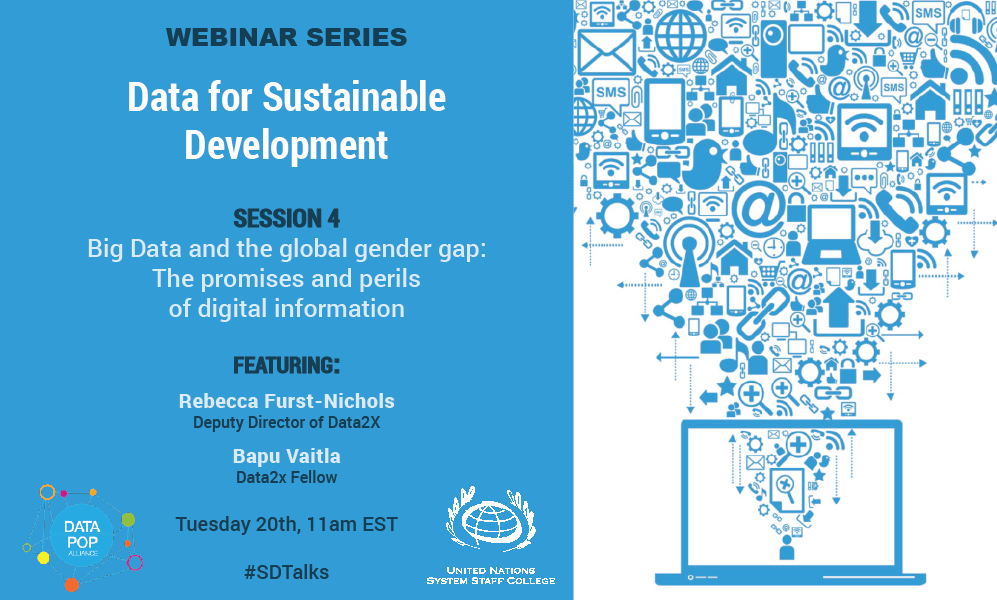Announcing the fourth Webinar of the SD Talks Special Series on Data for Sustainable Development series, produced jointly by Data-Pop Alliance and the UN System Staff College (UNSSC).
Guest speakers Rebecca Furst-Nichols (Deputy Director) and Bapu Vaitla (Fellow) of Data2X, a collaborative advocacy and technical initiative hosted by the United Nations Foundation that works to improve the use of global gender data, will discuss how Big Data provides a chance to improve our understanding of the lives of women and girls worldwide—to fill the global gender data gap in key areas like intrahousehold inequality, mobility, gender based violence, and mental health. More information on Data2X may be found here.
The session will be held on Tuesday 20 March 2018 at 4:00 PM CET (Paris) | 11:00 AM EDT (New York) | 10:00 PM ICT (Bangkok) and will be followed by a Q&A session where the speaker will take questions from the audience.
To join the live webinar, please go to http://bit.ly/SDTalksData4 (event number: 958 659 123, event password: Data4SD). Please register for this webinar in advance by going to http://bit.ly/SDTalksData4, clicking on Register and entering your details.
About the Speakers:
Rebecca Furst-Nichols is Deputy Director of Data2X, a collaborative technical and advocacy initiative of the UN Foundation that works to improve production and use of global gender data. She helps lead partnerships with data producing agencies, as well as Data2X’s management and operations. She has also worked on women’s economic empowerment research at the UN Foundation. Prior to joining UNF, she managed and conducted field research on livelihoods with migrants and refugees. She has worked and lived in Tanzania, Uganda, Kenya, France, Ecuador, and Israel. She holds an M.A. in Law and Diplomacy from The Fletcher School, Tufts University.
Bapu Vaitla is a Data2X Fellow managing the big data and gender strategy. His core interest is the relationship between human cooperation and child well-being: why people decide to work together (or not) for mutual benefit, and the effects of these decisions on the structure of states, markets, and ultimately the lives of children. He was born in India and grew up in California. He holds a BA in Nature and Culture and an MS in International Agricultural Development from UC-Davis, as well as a PhD in International Relations from the Fletcher School at Tufts University. He is currently a research associate at Harvard University and a visiting lecturer at UC-Davis. He is inspired by the potential, and unsettled by the politics, of big data.
For more information about the webinar series, please contact:
Daniela Cepeda Cuadrado, UNSSC Knowledge for Sustainable Development (d.cepeda@unssc.org)
Julie Ricard, Data-Pop Alliance (jricard@datapopalliance.org)
Ugo Caruso, UNSSC Knowledge for Sustainable Development (u.caruso@unssc.org)



![M002 - Feature Blog Post [WEB]](https://datapopalliance.org/wp-content/uploads/2025/10/M002-Feature-Blog-Post-WEB.png)





